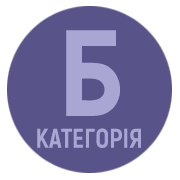TYPICAL WAYS TO TRANSLATE TITLES OF MODERN ENGLISH-LANGUAGE BOOKS
DOI:
https://doi.org/10.32782/philspu/2023.4.7Keywords:
onymes, translation transformations, translation techniques, background knowledge, extralinguistic factors.Abstract
The article deals with typical translation transformations and techniques used while translating book titles belonging to the contemporary English-language fiction into Ukrainian. In this work it has been stated that book titles belong to the category of onyms (proper names) in terms of structure (expression of the title by a single lexeme, simple nominal phrase, word-combination or different types of sentences) and functions (nomination and identification of a work of fiction in order to distinguish it from any other publication of a similar literary genre). The study applies an interdisciplinary approach to a comprehensive consideration of the problem of translating book titles at the interface of philology and translation sciences, since the method of translating onyms is often determined by the lexico-grammatical, semantic and pragmatic features of the source language unit, which poses a difficult task for the translator to implement not only nominative, but also informative, cultural, emotive, and expressive functions when translating a book title, as well as to convey its pragmatics (as part of the marketing strategy). It has been found out that depending on the expression of the original book title, translators utilize word-for-word translation or calque, antonymic translation, selecting dictionary equivalents (in case of polysemy), use omission to avoid redundancy, etc. It has been determined that background knowledge about the content and plot of a novel influences the translator’s choice of certain grammatical constructions or grammatical categories, such as the category of noun gender (it is not peculiar to English, as it was lost at a certain period of its historical development), which is primarily due to the different structure of Slavic and Germanic languages.
References
12 нових книжок, які варто прочитати у 2023 році. Vogue UA. URL: https://vogue.ua/article/culture/knigi/10-naygolovnishih-knizhok-yaki-varto-prochitati-u-2023-roci-51037.html (дата звернення: 30.11.2023).
Воробйова Т., Смалько Л. Назви художніх творів та заголовки як перекладацька проблема (на матеріалах англомовної художньої літератури у перекладах українською). Лінгвостилістичні студії. 2018. Вип. 8. С. 140–151.
Загальний народний англійсько-український словник. URL: https://e2u.org.ua/s?w=great&dicts=all&highlight=on&filter_lines=on (дата звернення: 30.11.2023).
Карабан В. І. Переклад англійської наукової і технічної літератури. Граматичні труднощі, лексичні, термінологічні та жанрово-стилістичні проблеми. Вінниця : Нова книга, 2004. 576 с.
Книжки, на які ми чекаємо в 2023 році. The Village. URL: https://www.village.com.ua/village/knowledge/booksof-the-month/334801-knizhki-na-yaki-mi-chekaemo-v-2023-rotsi (дата звернення: 30.11.2023).
Лужна О. Заголовок художнього твору як проблема перекладу. Науковий вісник Східноєвропейського національного університету імені Лесі Українки. 17, 2013. Розділ ІІ. Теорія і практика перекладу. С. 174–179.
Престижна література. Розповідаємо про головних претендентів на Букерівську премію 2021. URL: https://chas.news/current/prestizhna-literatura-rozpovidaemo-pro-golovnih-pretendentiv-na-bukerivsku-premiyu-2021 (дата звернення: 30.11.2023).
Селіванова О. О. Сучасна лінгвістика: термінологічна енциклопедія. Полтава : Довкілля-К, 2006. 716 с.
Що готує для читачів Старий Лев у 2023 році? Розповідаємо! URL: https://starylev.com.ua/news/shho-gotuyedlya-cytaciv-staryy-lev-u-2023-roci-rozpovidayemo (дата звернення: 30.11.2023).
Юлдашева Л. Заголовок як особлива номінативно-предикативна одиниця. Філологічний часопис. 2016. Вип. 1 (7). С. 87–93.
Cambridge Dictionary. URL: https://dictionary.cambridge.org/ (дата звернення: 30.11.2023).







